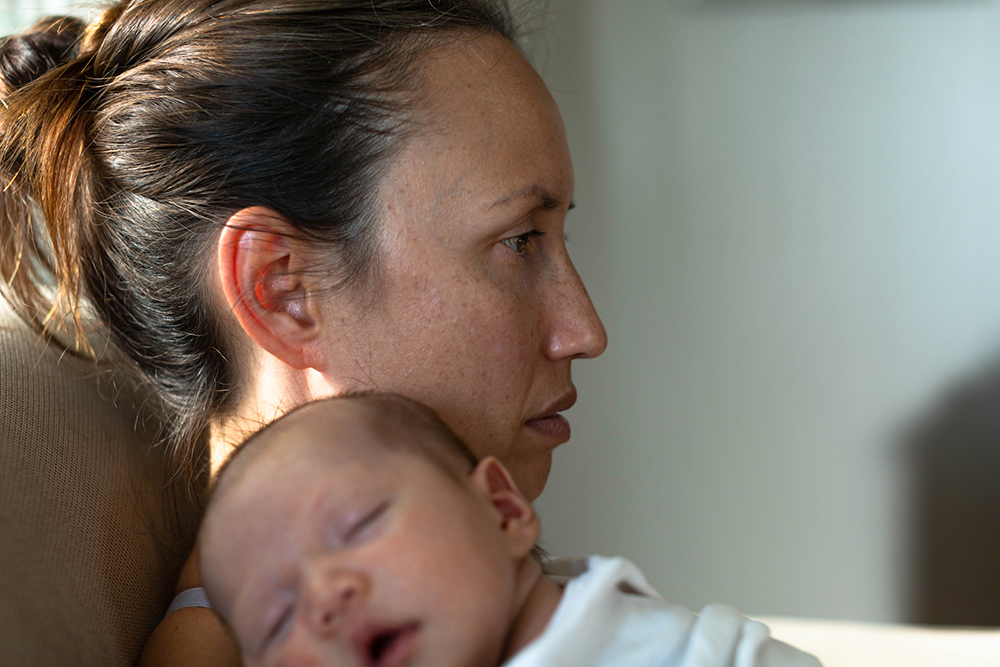Monday, May 22, 2023
Is it the “Baby Blues” or Postpartum Depression?
According to the Centers for Disease Control and Prevention (CDC), up to one in eight women experience postpartum depression in the first year after giving birth. Further analysis revealed the rate of depression diagnoses at delivery has increased in recent years, and it was seven times higher in 2015 than in 2000.
“Birthing parents experience a wide range of physical transformations, emotional changes and hormonal shifts during pregnancy and in the weeks and months after childbirth that can lead to postpartum depression,” says Catherine Daniels, MD, a psychiatrist with WMCHealth’s Behavioral Health Center who specializes in women’s mental health. “Despite its prevalence, many parents may not recognize the symptoms when they arise or seek help when they need it, but the right treatment can make all the difference.”

Red Flags and How to Spot Them
Symptoms of depression fall into distinct categories based on how they impact your emotional, mental and physical well-being. Postpartum depression can manifest in the following ways:
- Depressed mood: persistent feelings of sadness, hopelessness and despair; loss of interest in hobbies, activities and people, including your new baby
- Depressed cognition: changes in how you view the world and your place in it; lack of self-worth
- Neurovegetative symptoms: alterations in your sleep patterns and appetite; feeling slow and heavy or restless and agitated
“The severity and timing of symptoms vary from person to person,” says Dr. Daniels. “Many people actually begin experiencing symptoms while they’re still pregnant, so be sure to pay close attention to your thoughts and feelings even before your due date approaches.”
Postpartum Depression or Baby Blues?
The baby blues typically appear two to three days after giving birth and symptoms include increased emotional reactivity, mood swings, irritability, tearfulness or crying spells and difficulty sleeping.
“Though similar to some symptoms of postpartum depression, the baby blues only last a week or two after giving birth — if you are still experiencing symptoms after the two-week mark, consult your healthcare provider,” advises Dr. Daniels.
Understanding Risk Factors
When it comes to postpartum depression, there are several biological, psychological and social risk factors at play. For example, birthing parents with a personal or family history of psychiatric conditions tend to be at greater risk of suffering from postpartum depression. People who have complicated pregnancies and/or labor and delivery are also more susceptible, as well as those who experience economic hardship or have conflicted relationships with their partners.
Treatment Options
Much like other depressive disorders, postpartum depression can be treated in a number of ways. “Cognitive behavioral therapy and interpersonal therapy are often highly effective,” explains Dr. Daniels. “There are also several medications on the market that can offer relief and are safe for you to use while breastfeeding.”
Dr Daniels says if you are having intrusive thoughts, persistent feelings of sadness, guilt or hopelessness, difficulty sleeping or sleeping too much, and changes to your appetite and ability to concentrate, contact your obstetrician. The Postpartum Resource Center of New York, which offers emotional and peer support and educational information free of charge, is another resource.
Lastly, Dr. Daniels says you should not ignore thoughts of self-harm, harm to others or suicide.Call the suicide and crisis hotline at 988 right away or visit the nearest emergency department for care.WMCHealth offers emergency mental health services at member hospitals around the Network.
If you or a loved one are experiencing a mental health crisis, visit your nearest emergency department. WMCHealth is one of New York State's largest providers of mental health care and offers emergency mental health services at member hospitals throughout the Hudson Valley.
Learn more about WMCHealth’s Behavioral Health Center.